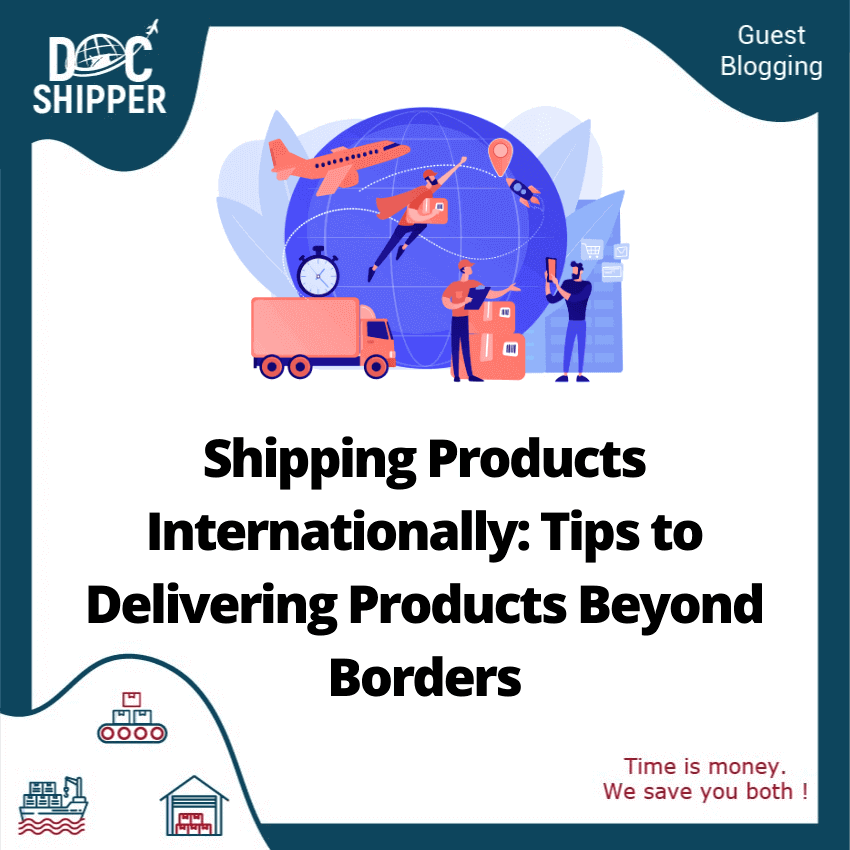Table of Contents
If you're the owner of an eCommerce business or are considering becoming one, you're probably weighing the benefits of shipping internationally. While this can be a challenge for companies to tackle, the growing pains will be worth it when your total addressable market grows, and you gain new customers.
As a small business owner, you may wrongly believe that you have to be running a large operation before you can start shipping internationally. However, by choosing the right logistics partners, you can open your doors to global customers sooner than you may think.
Before you take the international plunge, read through our tips and solutions to common shipping challenges so you'll be ready to serve your new client base across the world.
Tip DocShipper : In case you need assistance during your expedition contact a team of professionals who will help you manage your project's workflow
Why You Should Ship Internationally
Deciding to ship your products internationally can be a difficult decision to make, but the opportunity for eCommerce businesses to reach new customers and increase revenues typically outweigh the initial process required to get set up.
However, if you're still on the fence, it may help to know that now is a better time than ever to begin shipping overseas as we see a sharp increase in growth in middle-class populations worldwide. This is opening up new previously hard to reach markets in places such as Asia, Africa, and South America.
We are also witnessing tremendous growth in online shopping globally. More and more people are getting accustomed to shopping online as the COVID-19 pandemic grinds on. What does this mean for your business? Your customers are no longer confined to your city, state, or even country. With social media and SEO guiding people to your business's virtual front door, you have to be able to serve customers all over the world.
Given these circumstances, now is the perfect time to start shipping internationally. Let's go over how to do just that as simply as possible.
Choose Your Shipping Process
Determining your shipping and fulfilment process begins with understanding your business model and target market. Are you shipping to consumers directly, or do you sell to other businesses? Do you want to handle the details yourself, or would you rather partner with an expert to work through the red tape and deal with customs authorities? Based on your answers to these questions, you'll be able to decide what the best shipping arrangement for your company is.
Let's look at those details and the other major factors that go into building your shipping operation.

D2C, B2C, or B2B?
What kind of company are you? Do those three-letter options mean anything to you? If not, don't worry - we're breaking them down for you. It all comes down to who you sell your products to.
- Direct to Consumer (D2C) - This is a popular choice for companies that are wholesalers. In this business model, the middleman is removed, and customers buy straight from the manufacturer. Customers typically get the benefit of lower prices, so many will choose to do business with a D2C company when possible.
- Business to Consumer (B2C) - This is the most popular eCommerce business model, and it's where a business sells to a specific niche customer. They are not manufacturing the actual product, which is how they differ from D2C companies. Any consumer can order directly from their website, and orders are typically small to mid-size.
- Business to Business (B2B) - If you're a business, manufacturer, or distributor and you're selling directly to other businesses, you have a B2B model. The typical consumer does not buy directly from this kind of business, and orders are going to be much larger in scale.
DocShipper Tips : It's not just about reaching for the established network of contacts but rather customizing the services that deliver the best results. In order to guarantee these results the wisest way is to contact the professionals
Shipping and Fulfillment Models for D2C and B2C Companies
If your business model is D2C or B2C, the best shipping and fulfillment models for you to consider will be similar. Order sizes will typically be small to mid-size and will be shipped directly to consumers. There are three major options to consider:
Using a courier service for international delivery such as DHL or FedEx
This is a convenient option for many businesses because all major e-commerce platforms such as and WooCommerce have direct integrations with all the major international courier companies, thus allowing you to instantly get shipping rates, print labels and schedule shipments within minutes.

Using a multi-carrier shipping aggregator such as Shippo
This may help reduce shipping costs for your company. These companies help you with import and export documentation for global shipments. They may also offer order management and the automatic creation of shipping labels and packing slips.
Using a regional (or semi-regional) logistics service provider
These providers are focused on delivering exceptional service to specific areas. Since they're accustomed to working within a few familiar routes, they know what to expect as far as tariffs, compliance and documentation are concerned, thus saving you a lot of time and trouble. Below is a list of some well known players in this category:
- Savo Store - focused on delivery to East Africa
- Fastway Couriers - focused on delivery to South Africa
- Yun Express - logistics services into and out of China
- Yamato Transport - logistics services into and out of Japan

Shipping and Fulfillment Considerations for B2B Companies
If your business primarily sells merchandise or equipment to other businesses, you'll more than likely be shipping larger volumes, and possibly to multiple countries. Therefore, how you go about getting your product delivered to your customer is more complex than those companies that ship directly to a consumer. Don't let this intimidate you. There are ways to efficiently handle the challenges of shipping large consignments internationally without sacrificing your sanity.
Choosing a Freight Forwarder
To be successful at shipping internationally, you'll want to choose a freight forwarder to partner with. These companies arrange the shipping and logistics of large consignments from start to finish. It's crucial to choose the best freight forwarder for your business so we've come up with a list of 5 tips to help you do this. Hint: it's not all about the price.
- Ask about their experience. You need to be sure they're experts in dealing with customs and navigating the laws and regulations in both the origin and destination country. You're trusting them to handle the details for you so it's crucial that they know what to expect from customs officials in all countries that they deal with.
- Make sure they have a good reputation. A freight forwarder's success depends on their reputation and connections, so they'll want to make sure their customers consider them to be trustworthy and that their network is always growing. Ask for references from other businesses that they've worked with. They should be happy to share them with you if they're known for good service.
- Ask about their network. If they've been in the business for long, they should have connections in multiple countries, thus helping them negotiate better rates and provide customs brokerage services at the destination. It is important to your business that your freight forwarders network is healthy. This affects your bottom dollar, so make sure to check to see how far their influence reaches.
- Check out what services they offer to see if they're the right fit for you. Not all freight forwarders are a one-stop-shop. To make it easier for you, ask if they offer additional services such as cargo insurance and customs brokerage. The more they can handle for you, the better.
- Pricing isn't everything, but it should be clear. Now is not the time to bargain shop, but you should be clear on what you're paying and what it covers. Every freight forwarder will provide you with a rate quote upon request. Does the rate quote include pick up cartage, terminal transfers and origin handling charges? A good freight forwarder will have a transparent pricing model that you can look at before scheduling a shipment with them.
Consider Regionally Focused Freight Forwarders
Another consideration when it comes to B2B international shipping is using freight forwarders that are regionally focused. We think this is a smart choice for most B2B businesses as these forwarders are more likely to have a better understanding of how to navigate compliance and regulatory matters in the markets they are focused on.
Another major benefit of using regionally-focused freight forwarders is that there's a good chance they offer Delivered Duty Paid service. With DDP, the seller takes responsibility for the products until they reach their destination, including customs brokerage, thus taking the risk off of the buyer. While it does put the burden on you as the seller, it helps alleviate the stress that some international buyers may experience, making it a factor for many purchasing decisions.
Because many regionally focused forwarders will provide door-to-door logistics services along a route in which they have first hand operational experience, partnering with one of them could be one of the best ways to save yourself time and headaches. They can deal with all the quirks and bureaucracies of the origin and destination on your behalf while you focus on expanding your business in the next market.
Interested in our services? Need personalized information?
Our experts will answer you within 24 hours
Challenges to Expect When Shipping Internationally
Now that you've crafted the most ideal shipping process for your business, it's important to know and fully understand that there will still be challenges to overcome when you start shipping internationally. Don't let these deter you, though. By being aware of the possible hiccups along the way, you'll be prepared to overcome them should they arise.
While it's impossible to know what situations may come up, there are three issues we repeatedly see that are inevitably out of your control. Instead of letting them add frustration to your business operations, let's identify them upfront, so you can prepare the best that you can.
- Unpredictable customs duties and tariffs at the destination country. These fees are taxes levied against goods imported from one country to another and vary greatly, so research should be done for your specific destination and product category.
- Sharp cost fluctuations, especially during uncertain times, e.g., COVID-19 pandemic. This should come as no surprise to anyone currently in business. We're in unprecedented times, and the cost of transportation reflects this astutely.
- Transit delays, especially during uncertain times, e.g., the COVID-19 pandemic. As the cost of transportation has increased due to a multitude of factors in the marketplace, shipping delays and longer transit times have also become the norm.
Tips to Reduce Friction for You and Your Customers When Shipping Internationally
We like to think that anytime there's a challenge, there's also a solution. We showed you the three inevitable obstacles that you'll likely come across when you start shipping internationally. Now, here are some tips and possible solutions to overcome the potential challenges that international shipping may bring.
- Always ship DDP (Delivered Duty Paid) whenever possible - This eliminates the unpredictability of customs duties and tariffs at the destination country. And, as mentioned before, it offers an extra benefit to your buyer by adding a level of security and confidence since they'll avoid risks while shipping.
- Negotiate discounts based on volume wherever possible. Shipping rates are generally negotiable, so if you ship a certain volume of goods every month, you should be able to request a discount, especially if you can guarantee that same volume every month.
- Go with a regionally focused logistics service provider if you can find a reliable, well-renowned one. Follow the tips that we covered earlier and let a regionally-focused freight provider handle the minutiae for you. Time saved for you is money in your pocket.
- Make bookings with your freight forwarder as early as possible in the shipping cycle. This allows you to secure space with the airline or shipping line as early as possible. This is crucial, especially during uncertain times like we're currently in with the COVID-19 pandemic.

Take Your Business Beyond Borders
If you're not currently shipping your products internationally, now is the time to start! We understand that getting started with expanding your shipping radius can be a large mountain to climb mentally, but it's achievable and something you should tackle sooner rather than later.
With the rise of online shopping due to the pandemic and the ease of working with shipping partners, sending your goods across seas offers benefits that outweigh the challenges. While you're sure to meet some obstacles, overcoming them is worth the effort, due to the revenue and customer growth that await your business on the other side.
Contribute with your content to inspire thousands of logistics readers through our blog.
Publishing posts is a daily mission for us
FAQ | Shipping Products Internationally: Tips to Delivering Products Beyond Borders
I’m just now getting into business and I haven’t really decided if I should ship internationally. Is it really necessary to be successful?
While it’s certainly possible to be successful and stay domestic, it’s doubtful that you’ll reach the same level of success and sales that are available if you open your borders. With so many opportunities now available to buyers looking to find new and interesting retailers, there’s little reason to not offer to ship to international buyers and expand your customer base.
I’ve been using regular mail to ship my products and it’s working out for the most part. What are the benefits of using an aggregator?
Using an aggregator to outsource some of your shipping processes can be a huge benefit to your business in several ways. First, it lowers your risk by making sure that your product is getting to its destination since the shipping service has done thorough research regarding the customs and procedures of the receiving country. Second, you’ll save money by reducing your shipping costs. And finally, you’ll be able to offer added security for your buyers if you ship DDP.
My business has suffered during the pandemic so I was considering opening up to select international markets. Which ones do you recommend?
With the new growth in middle-class populations, there’s an increase in retail sales in markets that haven’t really seen this kind of boom before. Particularly, the markets in Asia, Africa, and South America are showing lots of promise for retailers looking to find new customers that are hungry for their products. Your competition may not be as aggressive in these areas since their growth is somewhat new so now is the time to jump in!
Do you think shipping costs will ever go back down?
If we only had a crystal ball! We definitely hope that the recent and steady rise in costs will eventually start to calm down, but with the new wave of Covid cases causing another shortage in labor - it’s not likely that we’ll see much of a change anytime soon. That’s why it’s so important to save costs where you can such as using an aggregator.
I use a freight forwarder now and I’m really unhappy with their service. What should I do?
We hear this all the time so you’re not alone! The good news is that often you can see improvements by having a conversation about your expectations. It’s entirely possible that the service provider you use isn’t aware that you’re unhappy and they’d be more than willing to make adjustments to keep you as a customer. However, if you have this conversation and still don’t see any change, it may be time to cut ties and find a new freight forwarder. If you do this, be sure to follow our suggestions for how to find the best one for your business.
Author Bio
Sidney Karnaja is the founder of Savo Store, a logistics and procurement services provider that works with corporations, start-ups, and non-profits, to help them acquire and transport goods to their offices in Africa. Savo Store also operates a platform that allows individuals in Africa to shop hassle free at any U.S. retailer. Sidney founded Savo Store with the goal of eliminating some of the hurdles that plague cross-border transactions between Africa and the rest of the world.
DocShipper info: Do you like our article today? For your business interest, you may like the following useful articles :
DocShipper Advise : We help you with the entire sourcing process so don't hesitate to contact us if you have any questions!
- Having trouble finding the appropriate product? Enjoy our sourcing services, we directly find the right suppliers for you!
- You don't trust your supplier? Ask our experts to do quality control to guarantee the condition of your goods!
- Do you need help with the logistics? Our international freight department supports you with door to door services!
- You don't want to handle distribution? Our 3PL department will handle the storage, order fulfillment, and last-mile delivery!
DocShipper | Procurement - Quality control - Logistics
Alibaba, Dhgate, made-in-china... Many know of websites to get supplies in Asia, but how many have come across a scam ?! It is very risky to pay an Asian supplier halfway around the world based only on promises! DocShipper offers you complete procurement services integrating logistics needs: purchasing, quality control, customization, licensing, transport...
Communication is important, which is why we strive to discuss in the most suitable way for you!






